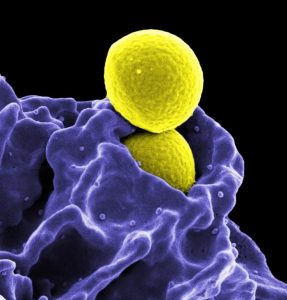New data presented today at ASM Microbe 2017 showed that Paratek Pharmaceuticals, Inc.’s Phase 3 antibiotic omadacycline is highly active against common bacterial pathogens in acute skin and skin structure infections (ABSSSI), respiratory tract infections (RTI), and the key bacterial pathogens responsible for urinary tract infections (UTI).

Image/NIAID
The study evaluated the in vitro antibacterial activity of omadacycline against Gram-positive and Gram-negative bacterial isolates collected from patients with multiple infection types in the United States, Europe, and Israel medical centers participating in the 2016 SENTRY Antimicrobial Surveillance Program. Paratek is a biopharmaceutical company focused on the development and commercialization of innovative therapies based upon tetracycline chemistry.
“These data reinforce the results of clinical and microbiologic data presented earlier this year at ECCMID. Omadacycline continues to show significant clinical promise against resistant pathogens such as MRSA and resistant strains of Streptococcus pneumoniae, and these findings are consistent with the clinical success we have seen with omadacycline to date in ABSSSI and community-acquired bacterial pneumonia,” said Evan Loh, M.D., President, Chief Operating Officer, and Chief Medical Officer, Paratek. “Importantly, this study also contributes to our growing body of knowledge of omadacycline’s in vitro activity against pathogens responsible for UTI, including E. coli. We believe there is a significant clinical unmet need for new oral, broad-spectrum antibiotic agents for the treatment of UTI and we are committed to advancing our clinical development program in this population.”
In the study, bacterial isolates were initially identified by the submitting laboratories and confirmed using a matrix-assisted laser desorption/ionization-time of flight mass spectrometry. Susceptibility testing was performed according to the Clinical Laboratory Standards Institute (CLSI) reference broth microdilution methodology and results were interpreted using the CLSI and the European Committee of Antimicrobial Susceptibility Testing breakpoint interpretive criteria.
Overall, omadacycline was highly active against Staphylococcus aureus, including methicillin-resistant Staphylococcus aureus (MRSA) that included isolates from both ABSSSI and RTI (MIC50/90 0.12/0.25 µg/mL), as well as strains displaying resistance to tetracyclines, fluoroquinolones, macrolides, and lincosamides.
Omadacycline was also highly active against other respiratory pathogens including Streptococcus pneumoniae including penicillin-, tetracycline- and macrolide-resistant strains (MIC50/90 0.06/0.12 µg/mL). In addition, omadacycline showed activity against Haemophilus influenza and Moraxella catarrhalis strains (MIC50/90 1/1 µg/mL and 0.25/0.25 µg/mL, respectively).
UTI pathogens Escherichia coli (E. coli) and ESBL-phenotype E. coli were also shown to be susceptible to omadacycline (MIC50/90 0.5/2 µg/mL, and 1/2 µg/mL respectively).
LISTEN: MRSA, C. diff and other healthcare-associated infections


One thought on “Phase 3 antibiotic, omadacycline, highly active against common bacterial pathogens in ABSSSI, RTI and UTI”